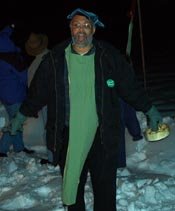On Friday, November 9, 2007, the Bishops of The United Methodist Church called for the United States and its coalition partners to begin an immediate withdrawal of all troops from Iraq.
In addition to calling for the immediate safe and full withdrawal of troops and no additional deployment of troops to Iraq, their resolution urges the United States and its partners to:
- Declare there will be no permanent military bases in Iraq.
- Increase support for military veterans of the Iraq war and all wars.
- Initiate and support a plan for reconstruction in Iraq, giving a high priority to humanitarian, social and educational needs of the Iraqi people.
The resolution is directed to U.S. President George W. Bush, the U.S. Congress, and leaders of the coalition.
“Every day that the war continues, more soldiers and innocent civilians are killed with no end in sight to the violence, bloodshed and carnage,” the bishops said in their resolution. They cited the deaths of more than 3,800 United States soldiers, 300 from other coalition countries, more than 28,000 wounded and the deaths of more than 76,000 Iraqi civilians.
The bishops made the call during their semi-annual meeting at a church retreat center in North Carolina’s Smoky Mountains. The bishops represent more than 11 million United Methodists in the United States, Africa, Europe, and the Philippines. About 125 active and retired bishops from around the globe attended the meeting.
In calling for the immediate withdrawal, the bishops said their position is based on the denomination’s position that “war is incompatible with the teachings and examples of Christ,” and Jesus Christ’s call for “his followers to be peacemakers.”
This is the latest in a series of steps the denomination’s leaders have taken to question the Iraq war. During their November 2005 meeting, the bishops approved a resolution urging President Bush, who is United Methodist, to create timeline for the withdrawal of U.S. troops from Iraq.
The bishops called on United Methodists throughout the world to “be peacemakers by word and deed,” by conducting regular prayer vigils for congregations and communities; to care for all impacted by the war, including combatants and non-combatants by honoring the dead, healing the wounded, and calling for an end to the war.
The full text of the resolution
United Methodist Council of Bishops Resolution on the Iraq War
Whereas, the Council of Bishops of the United Methodist Church, meeting Nov. 9 at Lake Junaluska, N.C., is committed to make disciples of Jesus Christ for the transformation of the world; and
Whereas, the Lord Jesus Christ, the Prince of Peace, calls his followers to be peacemakers (Matt. 5:9); and
Whereas, "We believe war is incompatible with the teachings and example of Christ" (Book of Discipline 2004, Par. 165.C); and
Whereas, the cost of the war in Iraq as of Nov. 7, 2007 has been the lives of 3,843 members of the U.S. military, 171 members of the United Kingdom military, 132 members of the other Coalition military, 28,385 U.S. military wounded, and the lives of at least 76,241 Iraqi civilians; and
Whereas the war in Iraq has displaced 2 million persons and forced another 2 million persons into refugee status;
Whereas, every day the war continues more soldiers and innocent civilians are killed with no end in sight to the violence, bloodshed and carnage;
Now, therefore, the Council of Bishops calls on the President and Congress of the United States and the leaders of all the nations in the Coalition Forces:
- To begin immediately a safe and full withdrawal of all military personnel from Iraq, with no additional troops deployed;
- To declare that there will be no permanent military bases in Iraq;
- To increase support for veterans of the Iraq war and all wars;
- To initiate and give strong support to a plan for the reconstruction of Iraq, with high priority given to the humanitarian and social needs of the Iraqi people, such as healthcare, education and housing;
Further the Council of Bishops calls United Methodist people throughout the world:
- To pray for peace and to have regular prayer vigils for congregations and communities;
- To care for all impacted by the war, including combatants and noncombatants by honoring the dead, healing the wounded and calling for the end of the war;
- To be peacemakers by word and deed that we may be called the children of God.
Resources

